Menu
Did you know that about 80% of Scotland’s carbon footprint comes from what people use? This shows how crucial it is to manage waste well. The UK’s Extended Producer Responsibility (EPR) Scheme is a big part of this. And it’s not just the environment that benefits. Farmers, especially those in the agri-supply sector, feel the impacts too.
Recently, DEFRA updated the rules on how businesses deal with packaging waste. This change affects AIC Member businesses in agriculture. They now have to check if their packaging is likely to end up in the bin at home or in public places. Each UK nation has its timeline for following these rules. This means businesses must know when to start and what items the rules cover.
Companies have until 31 May 2024 to share their 2023 EPR data. They can get help with this from the GOV.UK website. There, they can find guides and tools to make the job easier. For extra help, AIC’s Andrew Pearson is ready to assist.
The UK’s Extended Producer Responsibility (EPR) scheme aims to boost product stewardship. It links the environmental impacts of products back to their makers. This shift is part of making waste handling better for the planet and towards circular economy models. It adds duties for UK groups working with packaging.
The EPR scheme makes producers more responsible for their goods’ green effects. This means they must look after what happens to their products when they’re no longer needed. It promotes reuse, repair, and recycling. UK rules require those handling packaging to provide detailed reports. This includes businesses making over £1 million yearly and dealing with 25 tonnes or more of packaging.
The EPR scheme objectives are wide-reaching. They aim to speed up the move to green practices. One main aim is to cut down on carbon emissions by managing waste and resources better. It dovetails with UK waste management rules. These include providing records on packaging recycling and paying for waste management.
Promoting reuse and recycling also helps the environment.
It covers many packaging activities that all need careful reporting. These include selling packaged goods, packing products, and bringing in packaging. See the table below for a brief on reporting duties and activities:
| Criteria | Details |
|---|---|
| Annual Turnover | £1 million or more |
| Packaging Volume | Over 25 tonnes per year for medium organizations, over 50 tonnes for large organizations |
| Activities | Supplying packaged goods, importing, owning online marketplaces, hiring reusable packaging, supplying empty packaging |
It’s important to understand the rules differ by region and are towards full effect in 2023. Knowing about costs like scheme administration and environmental fees is key to following the rules. This helps create a strong system for product care.
DEFRA has new rules on packaging for the Extended Producer Responsibility (EPR) scheme. They apply to UK companies importing and supplying packaging. By 31 May 2024, these companies must report their packaging data for the 2023 EPR scheme.
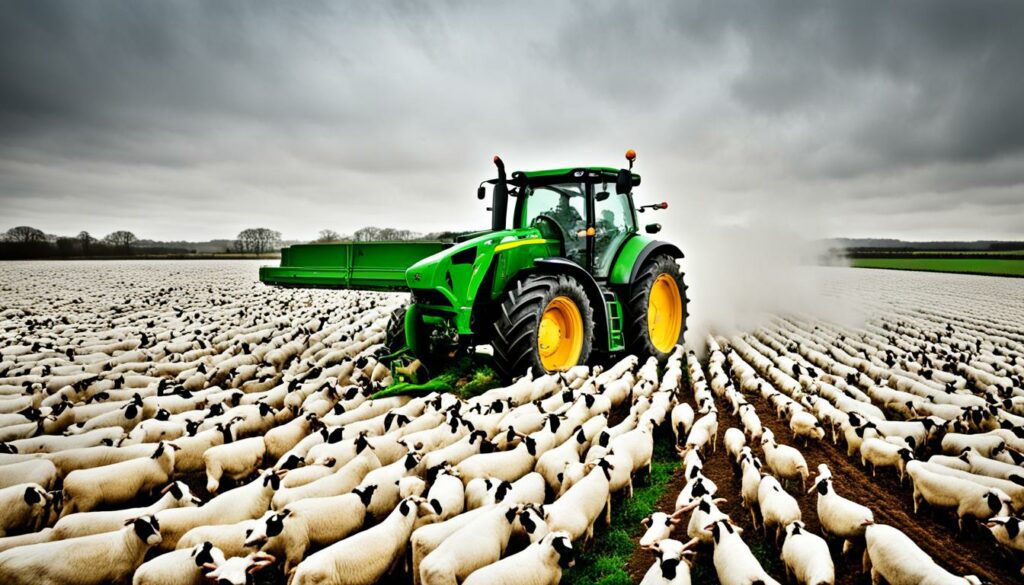
Companies need to figure out if their packaging counts as ‘household’ packaging. They use a two-stage test. This checks if the design means the packaging could end up in household or public bins.
Companies with over £1 million annual turnover and handling more than 25 tonnes of packaging in 2022 must submit data. Every six months, they collect data and may need to get PRNs or PERNs to show they’re recycling. This is part of their responsibility for the environment and contributes to a circular economy.
Businesses can use tools like spreadsheets from the GOV.UK website to report their packaging data. All UK companies, including those in Wales, must follow these rules. Doing so helps companies show they care about the planet and avoid fines for not following the rules.
The EPR scheme is key to making big steps in how we manage waste. It fits the idea of the circular economy. This scheme pushes companies to make things in a way that’s easier to reuse, fix, or recycle. That means we use less new raw materials and cut down on pollution. It also cuts waste by making products that last longer and can be used again.
The EPR scheme is changing how we handle waste by focusing on designing products that can be used again. This makes companies think more about the packaging they use. They have to share how much and what kind of packaging they use, making them more open and responsible. By doing this, companies help keep valuable materials from being thrown away, which is good for the environment.
“The EPR scheme in Scotland is crucial for fulfilling our circular economy ambitions and achieving our environmental targets,” outlined a recent report on Scotland’s environmental policies.
EPR is great for the environment. It makes companies take care of their products from start to finish. This cuts down on environmental damage. For example, it helps a lot with e-waste, reducing both the amount of waste and the harmful emissions it causes. It also focuses on reducing packaging waste, which is often not recycled. This means less trash overall.
| Waste Type | Annual Generation | Recycling Potential |
|---|---|---|
| Textile Waste (USA) | 17 million tons | High |
| E-Waste | 57 million tons | Moderate |
| Mattresses (USA) | 50,000 daily | 90% recyclable |
| Packaging Waste (USA) | 80 million tons | Less than 50% recycled |
Furthermore, by 1 April 2026, companies must put recycling labels on their packaging, except for flexible films. This makes it easier for us, the consumers, to recycle correctly. Also, delaying fees for packaging until 2024 gives companies time to get ready for these changes. It will help make our ways of living more sustainable.
The Extended Producer Responsibility (EPR) rules have big effects on the AIC members. They are a major part of the UK’s agri-supply sector. These new rules will change how the agricultural industry works. And it’s important for members to realise what they need to do.
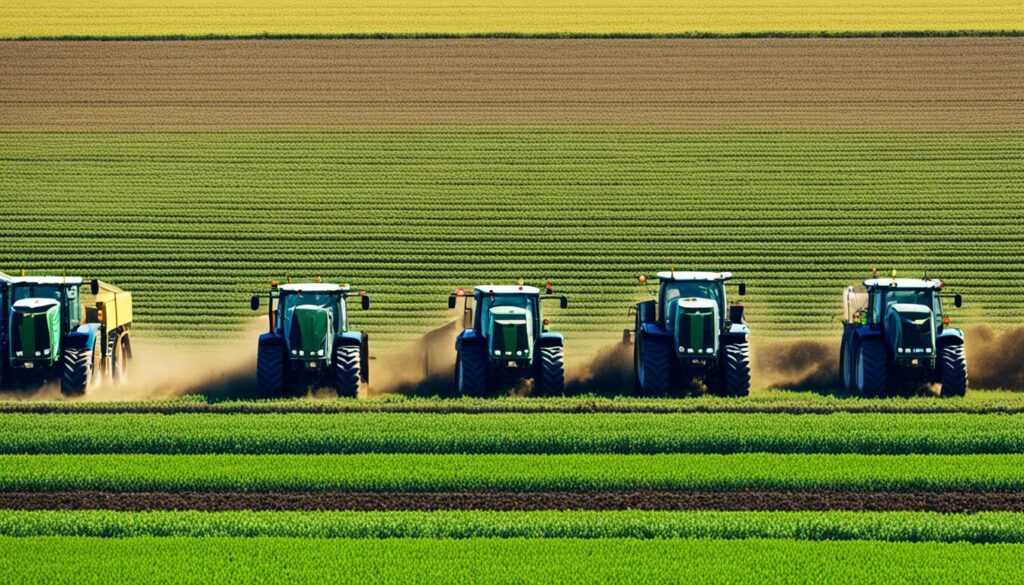
Starting on 1 April 2024, businesses in England, Scotland, and Wales, including the AIC, have to follow the new EPR data rules. In Northern Ireland, this starts on 1 May 2024. There’s extra time till 31 May 2024 to get used to the changes. Businesses will have to give packaging and organisation details every six months. They might have to share more details about certain packaging too.
The ‘household’ packaging rule now looks at how a product is used and if it might be thrown away at home. This might make AIC members rethink how they use packaging. They have to make sure they deal with waste in the right way. The GOV.UK website has lots of help for businesses trying to follow these rules.
Using a compliance scheme can make things easier for business members. These schemes take care of reporting, making it simpler. They also consider things like size and weight of packaging and how easy it is to buy. There’s a file you can download from GOV.UK to help with reporting. This is a key way to make sure you give the right information.
Agricultural work often needs special types of packaging. So, AIC members have to be ready for these EPR changes. They should use all the help and advice available. This way, they can handle waste well, do good for the environment, and meet all rules.
To sum up, the changes in EPR rules will really change how AIC members do things. It’s vital they keep up and deal with these new rules well. AIC’s support and advice will be very important as members face these changes.
Farmers all over the UK face strict demands on dealing with packaging waste under EPR. It’s vital to know what’s needed to follow the waste rules correctly.
Under the EPR, farmers have to keep detailed records on their packaging use. They need to record what kinds and amounts of packaging they use all the way from making to delivering their products. Different rules for each country must be followed, and there are important deadlines for when this data should be handed in.
The amount of textile waste in the EU is huge, reaching 12.6 million tonnes yearly. This shows why keeping accurate records is crucial. Farmers also need to track and report on all packaging they make, use, or bring in from outside. It’s a tough task, but it’s necessary for the environment.
To meet the EPR rules, farmers have to cut down on packaging waste. They can do this by:
Joining in on waste management programs is also a good move. These programs support everyone working together to manage waste better. It helps with keeping up with the changing waste rules and makes farming more eco-friendly.
Dealing with new waste rules can seem tough for farmers in the UK. This is part of the Extended Producer Responsibility (EPR) Scheme. Yet, these rules could help in using more sustainable farming methods. They also push for the development of strong plans to cope with changes.
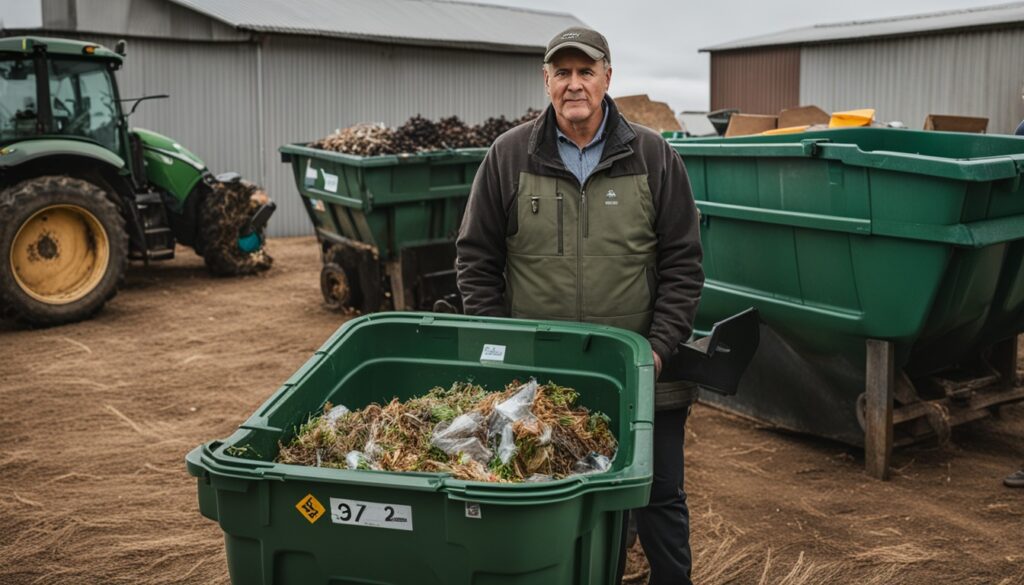
Farmers can start by using eco-friendly production methods. They should cut down on packaging and pick materials that are kind to the environment. Since 2015, UK shops have used far fewer plastic bags. Farmers can do similar things in their work.
One way farmers can adapt is by making products that last longer and are easier to recycle. They can use better packaging or materials that recycle well. This fits with the ideas in the Environment Bill. Farmers could also set up ways to collect old products so they are dealt with properly.
Farmers could also team up to reuse or recycle materials. By working with waste companies and others in farming, they can make a cycle that helps everyone. This not only meets the new waste rules but makes farming more eco-friendly and strong.
| Statistic | Impact |
|---|---|
| 50% decrease in greenhouse gas emissions from sites regulated under the Environmental Permitting Regulations (EPR) since 2010 | Encourages farmers to adopt sustainable practices and reduce greenhouse gas emissions. |
| 1.7 trillion litres of water risk removed through changes to abstraction licences | Reduces water waste and ensures efficient use of natural resources. |
| 99% of bathing waters met or exceeded minimum quality standards in 2021 | Highlights the success of strict waste management protocols. |
| 721 farm inspections in 2021, with 413 out of 976 improvement actions completed | Shows the importance of adherence to regulations and continuous improvement. |
| 77% recovery rate for waste produced by permitted facilities | Emphasises the effectiveness of recycling and recovery efforts in agriculture. |
These changes might be hard at first, but they lead to good results. From following the rules better to cutting down on harm to the planet. Adapting well to the new waste laws brings eco-friendly farming to every farm.
Looking at EPR success in the agri-supply sector teaches vital lessons on handling new rules. These examples can help farmers and agri-businesses follow the rules better. They can use this knowledge to get through their own change journeys.
Successes in EPR show big wins in handling waste and being greener. In Germany, they greatly upped their recycling game through tough EPR laws. Agri-businesses there now recycle more plastics and use greener packaging. This helps the planet and makes them leaders in good waste practice.
In Wales, the jump in household recycling from 5.2% to 60.7% shows EPR’s power when done well. The agri-supply sector needs to follow such good examples to be more sustainable. Farmers, especially, can learn from these stories to cut waste as EPR rules say.
Another big move was the EU recycling more plastic waste. They hit 30% of 26 million tonnes recycled in 2015. Such wins set the way for world EPR plans to use more recycled stuff and greener designs.
Think about this: the US, a small part of the world, makes half its solid waste. This shows we need EPR now. Agri-supply learnings can help cut the sector’s bad impact on Earth a lot.
| EPR Metrics | Germany | Wales | EU |
|---|---|---|---|
| Household Recycling Rate (2018-19) | 62.8% | 60.7% | 30% |
| Waste Plastic Production Increase | Twofold over two decades | N/A | N/A |
| Post-consumer Plastic Waste Recycled | Integrated collection and recycling | N/A | 30% of 26 million tonnes |
Real EPR success comes not just from following rules but from new ideas too. PROs can help make less waste and better packaging, which builds a circular economy. Sharing EPR wins in agri-supply shows a path to lasting success. The sector, with these tips, can lead in following rules and looking after the planet.
The Environment Agency plays a key part in making sure companies in the UK follow the Extended Producer Responsibility (EPR) rules. It checks that businesses do well in handling waste and reporting their data right.
In the UK, companies dealing with packaging are under the EPR rules. This involves any business, no matter how big or small. The Environment Agency helps these companies understand the rules and make sure they report their data. They also must do this even if they don’t have to pay EPR fees yet.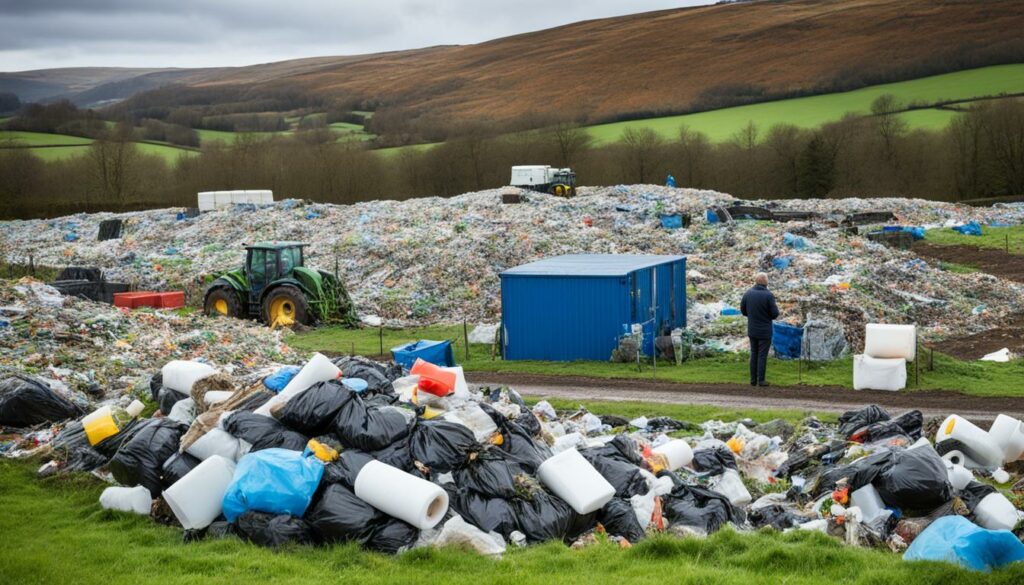
There are different rules for small and big businesses when it comes to reporting and paying fees. For instance, big companies must report twice a year and pay certain disposal fees. But small companies only need to report once a year and have no similar fees to pay. The Environment Agency ensures everyone follows the rules. This highlights their dedication to fair and effective waste management oversight.
With the introduction of Extended Producer Responsibility (EPR) regulations, waste management changes for many, including farmers. This shift brings financial impact on farmers, touching on their expenses and rules to follow. Looking at the EPR cost implications helps us understand the cost challenges. Also, knowing about the help from the government is key for farmers.
Farmers must now manage waste, especially packaging, to meet EPR rules. Doing this calls for new systems and rules for accurate waste reporting. An example is the recent UK decision to postpone packaging fees and reporting needs until 2025. While this helps in the short term, it shows the upcoming strict standards, increasing EPR cost implications.
The government understands the financial impact on farmers and offers help. This help comes in the form of grants and subsidies. It supports covering the costs of EPR requirements. With this aid, farmers can update their recycling, eco-design, and overall waste handling. In Scotland, for example, the ‘Making Things Last’ policy aims to lower economic hurdles. It furthers a circular economy by offering government financial support.
Also, the government works closely with farmers to shape EPR policies, ensuring their views are heard. This approach helps make future EPR changes easier to handle. Farmers can use these supports not just to meet EPR rules, but to also support environmental goals. This aligns with the push towards sustainability.
The world is talking a lot about sustainability these days. This means big changes are happening in farming. With the Extended Producer Responsibility (EPR) rules changing, farmers need to keep up. They must follow new recycling rules to help the planet and make their farms better in the long run.
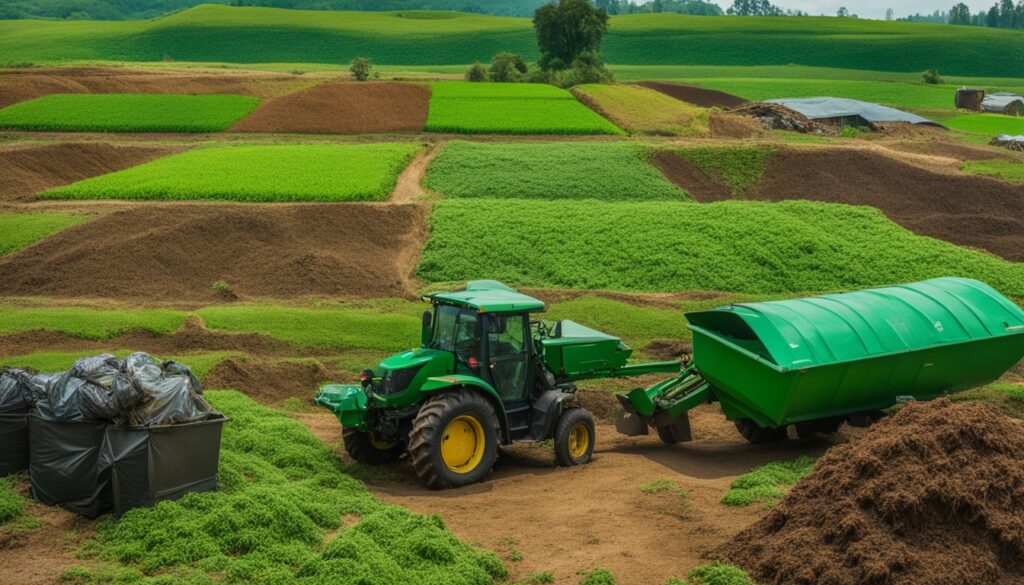
There are some important new EPR rules in the UK. The government has delayed packaging fees until 2025. They also made it easier for companies to report their recycling data by 2023. Starting in 2026, there will be changes to how we handle old electronics, making it all even more complex.
Zero Waste Scotland is leading the charge on making new rules for packaging. They want to include even more products in these rules. It’s all part of a bigger plan to use things over and over, moving towards a circular economy.
Following the new EPR rules can really help farmers in the long term. By using more sustainable methods, like fixing and reusing things, they can help cut down on Scotland’s carbon footprint. This is important because about 80% of the country’s carbon comes from how things are made and used.
By meeting the new recycling rules, farmers can help the environment, use materials better, and protect plants and animals. Plus, by supporting Sustainable Development Goal 12, which is about doing things in a way that helps our planet last, they can save money and look better to the market. This is because people like to buy from farmers who care about the earth.
The table below summarises key points regarding EPR policies and their long-term benefits:
| Aspect | Details |
|---|---|
| EPR Policy Updates | Deferred packaging fees until 2025; relaxed data reporting requirements for 2023; WEEE policy reforms from 2026. |
| Benefits for Farmers | Lower carbon emissions; material optimisation; enhanced biodiversity protection; cost savings; improved market positioning. |
| Supporting Organizations | Zero Waste Scotland, UK Government, Scottish Government. |
| Key Goals | Sustainable Development Goal 12; circular economy transition; long-term farming sustainability. |
Adhering to Extended Producer Responsibility (EPR) regulations is hard for farmers. They face issues like gathering precise data and changing how they handle packaging. This is worsened by the costs of managing waste to meet the new rules.
Complying with EPR brings big operational challenges for farmers. They find it hard to get and report data correctly. This is because farms create many types of waste. For example, e-waste makes up 57 million tonnes yearly, leading to 1,425 million tonnes of harmful gases. Also, the large amount of mattresses thrown out each day in the USA shows how tough waste management is.
The cost of keeping up with EPR is also a major issue. Each year, handling 80 million gallons of paint waste costs around $600 million. This is especially tough for small farmers who have less money to spare.
Farmers can use several strategies to beat these issues. Getting help from experts and using digital tools can make things easier. This can cut the time and effort needed to follow these new rules.
Changing their business methods to support eco-friendly ways is key. By adopting the circular economy, waste can become a new chance for better farming. Sharing knowledge and working together with other farmers can also solve a lot of these problems.
Lastly, looking at facts and data can give farmers a better idea of waste issues. For example, recycling is low for much of the packaging made in the USA. This shows the need for better recycling to meet EPR goals.
| Country | Textile Waste (Million Tonnes) | Annual E-Waste (Million Tonnes) | Packaging Recycling Rate |
|---|---|---|---|
| EU | 12.6 | 57 | Not Specified |
| USA | 17 | 57 | Less than 50% |
| Japan | 1.7 | 57 | Not Specified |
Finding the right answers can help farmers deal with EPR challenges. Using tech, eco-friendly practices, and teamwork can make this process easier. This way, we can get farmers to meet EPR rules smoothly.
In today’s world, working together for sustainable agriculture is key. With many parties involved, the journeys through the challenges of the EPR systems are easier, especially within the European Union. Here, around 400 EPR systems work together.
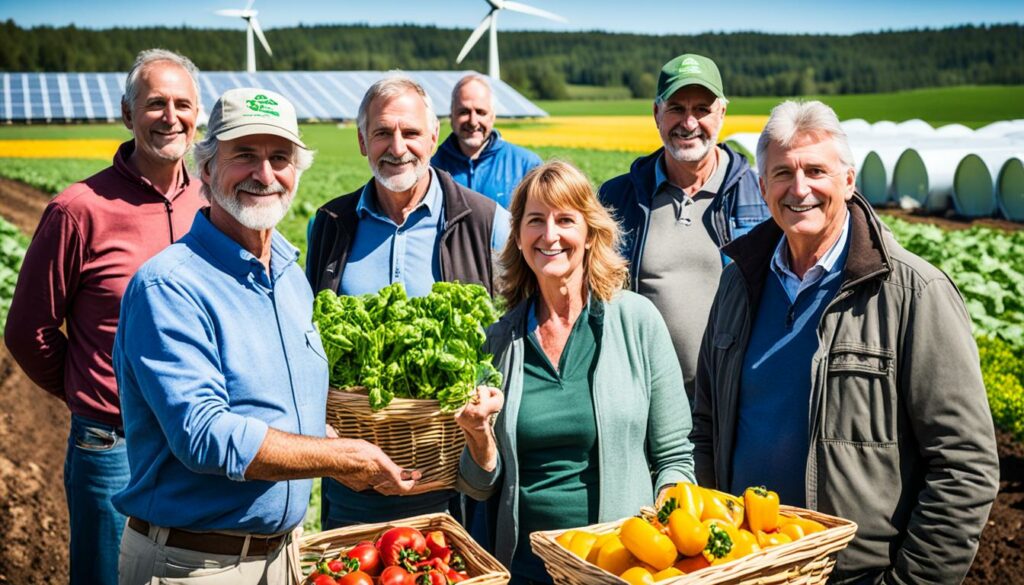
One big issue is cutting down plastic waste from farming. In Europe, people create 40% of this waste, and farm tasks make up the rest. So, it’s vital for groups in the industry to push for plans that reduce this waste. This move will make farming practices much greener.
Some joint sustainability initiatives are already making a difference. For instance, Wales made it a rule for local councils to recycle more. This led to household recycling jumping from 5.2% to 60.7% in 20 years. On the downside, a lot of new plastic for farming in Europe – 713KT – is not eco-friendly. This situation calls for serious efforts in managing plastic waste.
Teamwork is vital in moving these plans forward. Take Scotland’s new return scheme for drink bottles as an example. Plus, Germany has worked hard to reduce waste plastic production over the last twenty years. Yet, we still need to make strong waste management plans and ask for laws that help.
Working together, farmers, industry groups, eco groups, and policymakers can do a lot. We can share good ways of working, make joint plans for waste, and suggest new rules that are about the environment. This not only tackles the huge amount of plastic waste from farming in Europe but also builds a farming sector that cares for the planet.
| Country | Initiatives | Impact |
|---|---|---|
| Wales | Legally binding recycling targets for local authorities | Household recycling increased from 5.2% to 60.7% |
| Scotland | Drink bottle deposit return scheme (DRS) implementation | Enhanced recycling of drink bottles expected |
| Germany | Measures to double waste plastic production conservation | Greater energy and resource conservation |
These points show how crucial working together is. By taking on joint sustainability initiatives, we can push towards a tomorrow where farming helps, not harms, our planet.
In the UK, smallholder farmers face unique challenges with the EPR scheme. They often struggle because they lack resources and access to needed information. This makes it hard for them to comply with the EPR scheme regulations.
Smallholder farmers find it hard to keep up with the EPR scheme’s demands. They must track packaging data, which can be overwhelming. Especially if they have only a few people or resources to help.
Bigger businesses find this task easier because of their size and resources. However, small farms deal with specific issues linked to their size and the types of packaging they use.
Efforts are being made to support these small farmers. They are getting personalised advice from environmental agencies. This helps them understand and meet their EPR scheme duties.
Also, there are funds available to help with the costs. While small organisations start their registration in 2024, bigger ones have different rules. They, for example, use Packaging Waste Recovery Notes for their recycling.
Community support is also crucial. It allows small farms to share tips and save on resources. Plus, it offers emotional support. This could be through advice on how to handle EPR tasks.
Overall, the goal is to make sure small farms don’t bear the brunt of EPR changes. They are vital in the move towards better waste management practices.
Modern farmers must use EPR compliance technology. This is because of new rules affecting those in the Agricultural Industries Confederation (AIC). Since April 2024, regulations on packaging have changed. They now have a two-stage test.
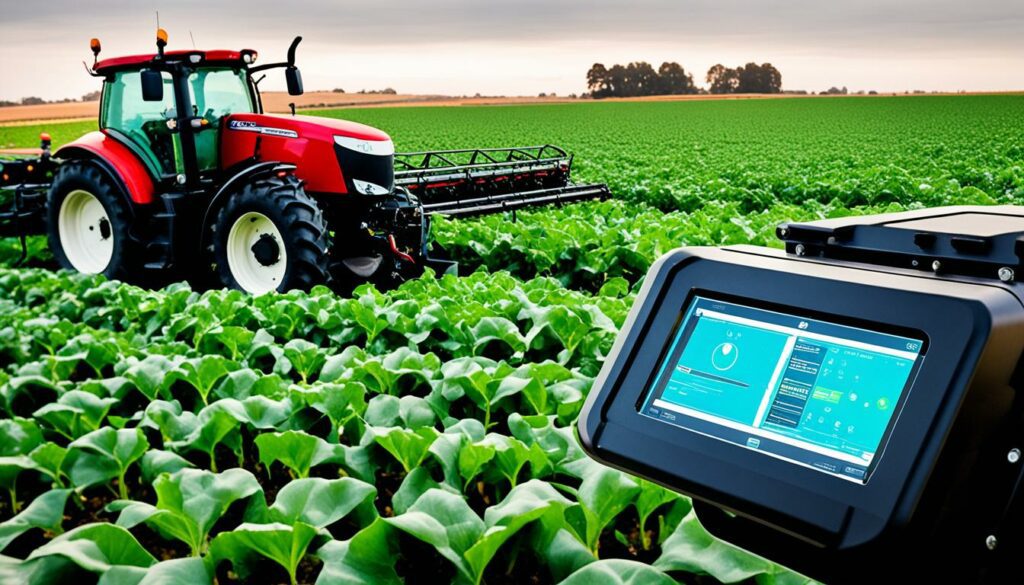
The deadline for submitting packaging data was extended to 31 May 2024. This gave farmers more time to adjust to the new rules. Thanks to farming innovations, the process has become easier. Digital tools let farmers manage data better, which helps in meeting the new rules on time.
There are also agricultural tech solutions that focus on packaging. These include eco-friendly packaging solutions and platforms for keeping track of materials. Using these tools can help farmers collect data automatically. This makes reporting more thorough and meets the EPR criteria.
A tool to help with reporting is available on the GOV.UK website. It makes creating valid packaging data files easier. Schemes can also use this tool to submit data for the farmers they represent.
| Regulation Aspects | Details |
|---|---|
| Effect Date | 1 April 2024 (England, Scotland, Wales), 1 May 2024 (Northern Ireland) |
| Data Submission Deadline | 31 May 2024 for 2023 Data |
| Reporting Periods | January-June 2023, July-December 2023 |
| Support | GOV.UK downloadable spreadsheet file |
EPR compliance technology changes how farmers deal with rules. It not only makes following the rules easier but also leads to better practices in farming. This helps the agricultural sector meet its sustainability goals.
To make the EPR programme better in farming, it’s key to look at some specific steps. Making it easier for farmers to follow the rules is top priority. This involves simplifying the paperwork and rules, so farmers are not overwhelmed.
More education and training for farmers is vital. They need to understand and use EPR policies. Offering lessons and workshops can help them pick up the necessary skills. This will get farmers more involved in sustainable farming.
It’s also important to reward those who use green ways. This can be through money like grants or tax breaks. By rewarding farmers for green efforts, more will join in. Plus, it helps farming become more eco-friendly.
Approximately 80% of Scotland’s carbon footprint is caused by goods and services consumption, underlining the importance of effective EPR policies in mitigating environmental impacts.
Policies should fit the unique situation of farming. This way, farmers can play a big role in a circular economy. They will also be supported financially. Policies that meet farming’s needs help the sector and the environment.
| Policy Recommendation | Description | Expected Impact |
|---|---|---|
| Simplify Compliance Procedures | Streamline the administrative tasks required for EPR compliance. | Reduces burden on farmers, increasing adherence to regulations. |
| Expand Education and Training | Provide comprehensive resources and workshops for farmers. | Enhances understanding and engagement with EPR policies. |
| Incentivise Sustainable Innovation | Offer financial benefits for adopting eco-friendly practices. | Encourages adoption of sustainable technologies and methods. |
| Tailor Regulations | Adapt policies to the specific needs of the agricultural sector. | Ensures regulations are effective and practical for farmers. |
The Scottish Government is working hard to fight climate change and protect nature. Following these EPR policy recommendations can help even more. Together, we can make farming friendlier to the planet.
The UK’s Extended Producer Responsibility (EPR) scheme is changing how farmers deal with waste. They need to report packaging data by 2023. Also, they will start paying packaging fees in October 2025. If farmers don’t follow the rules, they could face tough penalties. Defra is getting ready for a Deposit Return Scheme for bottles in 2025. This means more rules to follow but also new chances for farmers.
The UK Packaging Regulations are very important. Farmers who don’t keep up with them could get into trouble. There are big plans in Europe to make all packaging recyclable by 2030. By the end of 2024, every EU country must have an EPR scheme. These rules show how serious the EU is about going green. UK farmers need to be part of this too.
Meeting these targets is not just about following the law. It’s also good for business. The UK’s recycling rate has gone up a lot in recent years. This shows doing the right thing is possible and profitable. The costs for packaging producers are also going up. They might go from £200-300 million a year to nearly £3 billion. This change is huge but essential for saving our planet. The future of farming and the environment are closely linked. Farmers can use technology and work with the government to protect our planet. By doing so, they ensure a brighter future for all.
The EPR Scheme makes producers, including farmers, responsible for their products’ environmental impact. It asks them to handle waste properly and be more sustainable.
The EPR Scheme wants to lower carbon emissions. It also aims to boost the reuse, repair, and recycling of products. This helps move the UK towards a circular economy.
Businesses need to decide if their packaging is ‘household’ with a test. They then have to report this data by 31 May 2024. The rules explain how to do this accurately.
EPR helps make the life of products longer by reusing, remanufacturing, and recycling them well. It encourages making products in ways that cause less waste and harm.
AIC members need to recognise and manage ‘household’ packaging better. They must follow the new rules and use sustainable methods more.
Farmers need to submit specific packaging and organisational data by a certain date. They can find help with this on the GOV.UK website.
To cut down on packaging waste, farmers can use less, choose materials that can be recycled, and join in on waste management schemes.
To adjust, farmers should start using materials that are better for the Earth. They can also make products that last longer and create ways to recycle. It’s important to act in ways that fit the circular economy.
By looking at success stories, farmers can see how to meet the rules. They can learn to use materials that are good for the environment and manage waste better.
The Environment Agency checks if businesses are keeping the EPR rules. They offer advice and they can penalise those that don’t Follow the rules well.
The EPR rules might make running a farm more expensive. The government can provide money and other help to keep farmers in business while they follow the rules.
EPR will likely get stricter and cover more kinds of products. Choosing to use sustainable methods now will save money and help the environment. This also makes farms more attractive to buyers.
Farmers find it hard to collect data and change how they use packaging. They can get help through advice, technology, and changing how they run their farms. Working with other farmers can also make things easier.
Working together is key to dealing with the complexity of EPR. Farmers, groups, and government agencies can share what works best. They can make plans together for reducing and managing waste well.
Smallholders often have few resources to meet the rules. There are ways to get help, like advice and money for projects. Local support is important too.
New tech helps farmers follow the rules by organising data and using better packaging. It also makes it easier to recycle and reduce waste.
Policymakers can make the rules simpler and help people learn how to follow them. They should encourage new ways of being green that also make money. This helps farms stay in good shape and protects the environment.